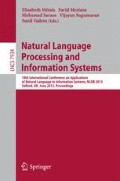Abstract
In this project, we investigate the generation of wordplay that can serve as playful “explanations” for given names. We present a working system (part of work in progress), which segments and/or manipulates input names. The system does so by decomposing them into sequences (or phrases) composed of at least two words and/or transforming them into other words. Experiments reveal that the output stimulates human users into completing explanations creatively, even without sophisticated derivational grammar. This research applies to two languages: Hebrew and English. The applied transformations are: addition of a letter, deletion of a letter and replacement of a similar letter. Experiments performed in these languages show that in Hebrew the input and output are perceived to be reasonably associated; whereas, the English output, if perceived to be acceptable rather than absurd, is accepted as a humorous pun.
Access this chapter
Tax calculation will be finalised at checkout
Purchases are for personal use only
Preview
Unable to display preview. Download preview PDF.
References
Redfern, W.D.: Puns. Basil Blackwell, Oxford (1984); 2nd edn. Penguin, London (2000)
Sharvit, S.: Puns in Late Rabbinic Literature. In: Schwarzwald, O.R., Shlesinger, Y. (eds.) Hadassah Kantor Jubilee Volume, pp. 238–250. Bar-Ilan University Press, Ramat-Gan (1995) (in Hebrew)
Sharvit, S.: Play on Words in Late Rabbinic Literature. In: Hebrew Language and Jewish Studies, Jerusalem, pp. 245–258 (2001) (in Hebrew)
Dynel, M.: How do Puns Bear Relevance? In: Kisielewska-Krysiuk, M., Piskorska, A., Wałaszewska, E. (eds.) Relevance Studies in Poland. Exploring Translation and Communication Problems, vol. 3, pp. 105–124. Warsaw Univ. Press, Warsaw (2010)
Hempelmann, C.F.: Paronomasic Puns: Target Recoverability towards Automatic Generation. PhD thesis. Purdue University, Indiana (2003)
Waller, A., Black, R., Mara, D.A.O., Pain, H., Ritchie, G., Manurung, R.: Evaluating the STANDUP Pun Generating Software with Children with Cerebral Palsy. ACM Transactions on Accessible Computing (TACCESS) 1(3), article no. 16, at the ACM site (2009)
de Lange, C.: Get Out of the Groove. New Scientist 215(2879), 47–49 (2012)
HaCohen-Kerner, Y., Cohen, D.N., Nissan, E., Zuckermann, G.: Graphemic Puns, and Software Making Them Up: The Case of Hebrew, vs. Chinese and Japanese. In: Felecan, O. (ed.) Onomastics in the Contemporary Public Space. Cambridge Scholars Publishers, Newcastle (in press)
HaCohen-Kerner, Y., Avigezer, T.S., Ivgi, H.: The Computerized Preacher: A Prototype of an Automatic System that Creates a Short Rabbinic Homily. B.D.D. (Bekhol Derakhekha Daehu): Journal of Torah and Scholarship 18, 23–46 (2007) (in Hebrew)
Nissan, E., HaCohen-Kerner, Y.: The Design of the Phono-Semantic Matching (PSM) Module of the GALLURA Architecture for Generating Humorous Aetiological Tales. In: Felecan, O. (ed.), Unconventional Anthroponyms. Cambridge Scholars Publishers, Newcastle (in press)
Nissan, E., HaCohen-Kerner, Y.: Information Retrieval in the Service of Generating Narrative Explanation: What we Want from GALLURA. In: Proceedings of the 3rd International Conference on Knowledge Discovery and Information Retrieval (KDIR), pp. 487–492 (2011)
Nissan, E., HaCohen-Kerner, Y.: Storytelling and Etymythology: A Multi-agent Approach (A Discussion through Two “Scandinavian” Stories). In: HaCohen-Kerner, Y., Nissan E., Stock, O., Strapparava, C., Zuckermann, G. (eds.), Research into Verbal Creativity, Humour and Computational Humour. Topics in Humor Research, Benjamins, Amsterdam (to appear)
Wintner, S.: Hebrew Computational Linguistics: Past and Future. Artificial International Review 21(2), 113–138 (2004)
Zuckermann, G.: “Etymythological Othering” and the Power of “Lexical Engineering” in Judaism, Islam and Christianity. In: Omoniyi, T., Fishman, J.A. (eds.) Explorations in the Sociology of Language and Religion, Benjamins, Amsterdam, ch.16, pp. 237–258 (2006)
Author information
Authors and Affiliations
Editor information
Editors and Affiliations
Rights and permissions
Copyright information
© 2013 Springer-Verlag Berlin Heidelberg
About this paper
Cite this paper
HaCohen-Kerner, Y., Cohen, D.N., Nissan, E. (2013). Experiments in Producing Playful “Explanations” for Given Names (Anthroponyms) in Hebrew and English. In: Métais, E., Meziane, F., Saraee, M., Sugumaran, V., Vadera, S. (eds) Natural Language Processing and Information Systems. NLDB 2013. Lecture Notes in Computer Science, vol 7934. Springer, Berlin, Heidelberg. https://doi.org/10.1007/978-3-642-38824-8_32
Download citation
DOI: https://doi.org/10.1007/978-3-642-38824-8_32
Publisher Name: Springer, Berlin, Heidelberg
Print ISBN: 978-3-642-38823-1
Online ISBN: 978-3-642-38824-8
eBook Packages: Computer ScienceComputer Science (R0)

